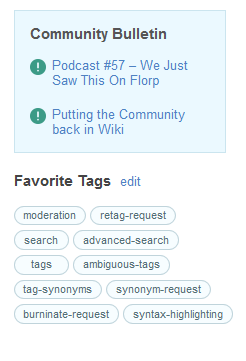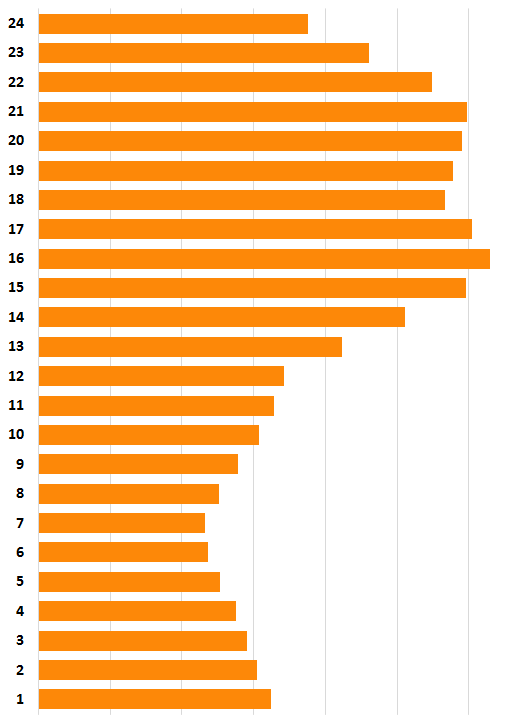Take the tour, earn a badge.
If you are reading this, you are probably the sort of person who has the ability to succeed on Stack Overflow. Even so, the tour provides the big picture of how the site ought to work. It also gives you a badge. Another easy badge is Autobiographer, which has the advantage others can learn who you are as a person.
Consider editing.
The next easiest badge to earn is Editor. Anyone may submit a suggested edit for community review. If you find a mistake or outdated information on any post and you know how to fix it, click on the edit link and suggest a change. Editing is a good way to learn what the community expects from posts and also will familiarize you with how posts are formatted with Markdown. In addition, successfully suggesting edits earns a small amount of reputation.
Answering is often easier than asking.
It's almost certainly gotten exponentially harder to ask questions than when many of us earned our (now slightly dusty) beta badges. This chart tells the story:
year questions avg_score deleted_rate closed_rate dupes dupe_rate
---- --------- --------- ------------ ----------- ------ ---------
2008 70372 18.40 6.4 3.9 1145 1.63
2009 394567 6.19 4.5 3.6 4800 1.22
2010 820161 3.43 6.3 3.4 10162 1.24
2011 1445142 2.18 7.9 5.7 21103 1.46
2012 2065664 1.28 10.2 7.9 34471 1.67
2013 2759442 0.61 14.7 10.9 52002 1.88
2014 3040440 0.17 17.9 10.4 68500 2.25
2015 2061746 0.08 17.2 8.7 52759 2.56
New questions are more likely to be closed or deleted than in the past. It's gotten harder to ask questions that haven't already been asked. In the best of times, asking interesting questions is harder than answering them. So I'd recommend looking for questions you can try answering before starting to ask.
If you have a different way of looking at a question, it really doesn't hurt to add another answer even if there's an accepted answer. The goal isn't to just help the one person who asked the question, but to help anyone with that same general problem who might find the question via search. There's no guarantee that your answer will be upvoted, but as long as your answer is accurate, clear, and noticeably different than others, it's not likely to be downvoted.
Consider learning a new language.
There's a good chance that your question in C, C++, C#, Objective-C, Java, JavaScript, JavaFX, or JSF has already been asked. Less popular languages have less duplication and fewer grouchy grognards who have seen the same few questions asked over and over again. Newer languages tend to not reach that level of saturation, so it might be worthwhile to learn a new language for the purposes of getting started on Stack Overflow. Plus it's a great way to teach yourself programming in 10 years.
Debug before asking.
Sometimes, you just need some help solving a problem in your code at which point a question on Stack Overflow would be a good entry point. Don't make the mistake of posting your code verbatim. Instead, search for the handful of lines that seem to be buggy. Surprisingly, doing just that is often enough to discover the problem. If your goal is to participate on Stack Overflow, don't be afraid to ask and answer your own question. Be sure to check for duplicate questions before posting (in which case, consider posting your own answer), but don't feel as if your question is wasteful if you already know the answer. Remember that helping the initial asker is not the primary goal of Stack Overflow.
Learn from setbacks.
You will almost certainly be downvoted at some point using the site. You might get critical comments, have a question closed, or a post deleted. In those situations, it's important to know that:
- it's not personal,
- there's almost always something you could have done better, and
- recovery won't be hard if you take a few minutes to understand what happened.
Far and away the biggest mistake people make when using the site is ignoring advice they don't immediately understand. When people continue to post without learning what those signals are trying to say, they start running into suspensions, blocks and rate limits.
Get help and get meta.
Most of the common problems people run into are answered in the help center. In particular, read how to ask and how to answer. If those don't help, look around on meta for other people who have had the same problem. If that still doesn't help go ahead and ask about your specific situation here on meta. Be aware that meta has very similar conventions to the main site. Much of the above advice applies here too.

